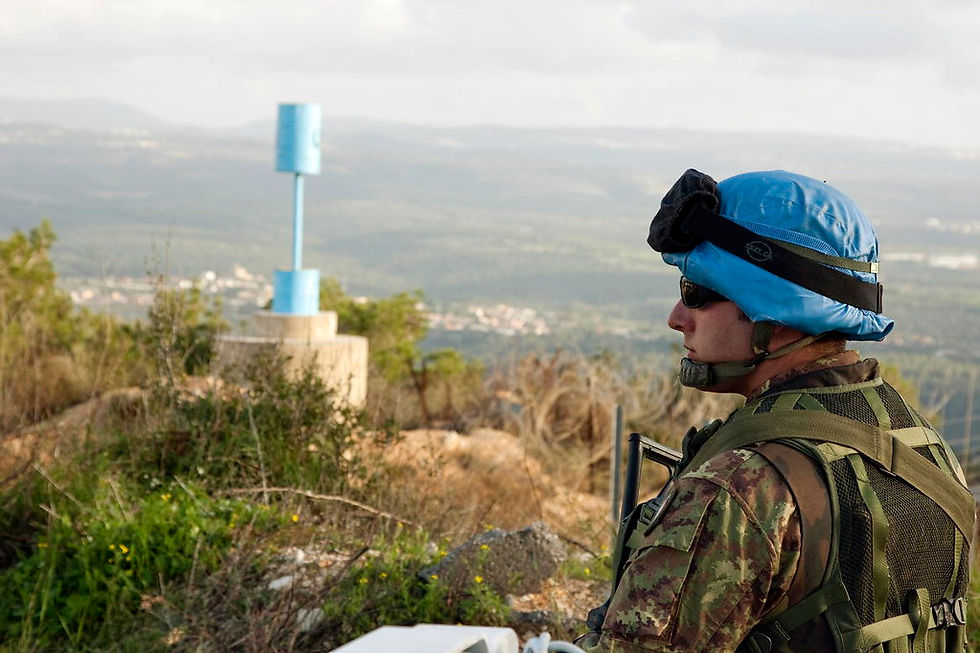What is UNIFIL and Why Are They Part of the Conflict?
- Elon Gilad
- Oct 16, 2024
- 4 min read
Updated: Nov 6, 2024

While the United Nations Interim Force in Lebanon (UNIFIL) has played a role in monitoring ceasefires and supporting Lebanese sovereignty, its effectiveness has been increasingly challenged in recent years.
What is UNIFIL?
The UNIFIL was established in 1978 to maintain stability along the Israel-Lebanon border. With around 10,000 peacekeepers from 49 countries, it is one of the largest UN peacekeeping operations in the world.
Following the 2006 war between Hezbollah and Israel, the UN Security Council Resolution 1701 was adopted on August 11, 2006. This resolution expanded UNIFIL's mandate, tasking it with keeping southern Lebanon—specifically the area between the Litani River and the Israel-Lebanon border—free of Hezbollah armed personnel, assets, and weapons.
However, achieving this objective has proven to be a significant challenge.
Why is the UNIFIL involved in the conflict
After Hamas’s deadly October 7, 2023 attack on Israel, Hezbollah attacked Israel from southern Lebanon. Over the subsequent year, Hezbollah launched thousands of anti-tank missiles, UAVs, and rockets into Israel from southern Lebanon, causing significant disruption in northern Israel.
In response, Israel launched a military operation on September 30, 2024, with the stated aim of clearing Hezbollah's presence and weapons from the region to restore safety for Israeli civilians living near the border.
Since the escalation, UNIFIL's role and effectiveness has come into sharp focus, raising questions about its ability to fulfill its mandate and its place in the ongoing conflict.
During its ground operations, the Israel Defense Forces uncovered a substantial network of weapons and military infrastructure, underscoring UNIFIL's failure to maintain a Hezbollah-free zone.
Among the discoveries were:
several tunnels
military outposts
weapons caches, such as missile launchers, hundreds of small arms, grenades, rockets, and mortar shells
discovery of uniforms, motorcycles, and other equipment prepared for an invasion of Israel similar to but much more extensive than the October 7 attack by Hamas—highlighting Hezbollah’s intentions
Why has UNIFIL failed?
While UNIFIL is responsible for monitoring violations of the ceasefire, it does not have the power to forcibly disarm Hezbollah or remove its fighters.
This responsibility lies with the Lebanese Armed Forces (LAF), who are tasked with securing the area in accordance with Resolution 170, however, it has been completely unable to maintain control over the area.
Hezbollah openly acknowledges maintaining military capabilities in violation of the resolution, and efforts to disarm the group have been largely ineffective. The terror group’s military strength far exceeds that of the LAF, making it virtually impossible for the Lebanese army to disarm the group, even if it were willing to do so.
Despite calls from the UN Secretary-General for the Lebanese government to address this issue, little has been done, likely due to several factors, including the LAF’s reluctance to provoke Hezbollah or upset Lebanon’s fragile political balance.
Compounding the problem, patrols were often blocked, harassed, or denied access to key areas, limiting their ability to monitor violations effectively, which arise from both local communities, who may view UNIFIL with suspicion, and from Hezbollah, which holds considerable political and military influence in southern Lebanon.
Calls for UNIFIL’s withdrawal
Following Israel’s ground operations in southern Lebanon, Israeli Prime Minister Benjamin Netanyahu has called for UNIFIL’s evacuation from the region.
On October 15, 2024, Netanyahu addressed UN Secretary-General António Guterres, accusing UNIFIL of “providing Hezbollah terrorists with human shields” and stating that their presence endangers both peacekeepers and Israeli soldiers.
Israel says that Hezbollah has exploited UNIFIL’s proximity, launching attacks from positions close to peacekeeping posts. UNIFIL has refused to comply.
This situation has led to several incidents where Israeli forces have fired at UNIFIL positions, resulting in injuries to peacekeepers and damage to UN facilities.
On October 13, 2024, Israeli tanks reportedly destroyed the gate of a UNIFIL base and entered the compound, while nearby explosions have caused UNIFIL personnel to suffer from smoke inhalation.
At least five UNIFIL peacekeepers have been wounded since the ground operation began. European leaders have condemned these incidents, including EU foreign policy chief Josep Borrell, an Israel critic.
Wrap up
UNIFIL’s role in southern Lebanon is undeniably complex. Peacekeepers have been unsuccessful in preventing Hezbollah’s military buildup, including its limited mandate, Hezbollah’s dominance, and the LAF’s inability or unwillingness to enforce Resolution 1701.
Temporarily withdrawing UNIFIL personnel for the duration of the conflict could reduce risks to peacekeepers and allow Israel to carry out its security operations. After hostilities end, a re-evaluation of UNIFIL’s mandate and its cooperation with the LAF will be necessary to ensure that future peacekeeping efforts can effectively contribute to a stable and Hezbollah-free southern Lebanon.

Elon Gilad is an Israeli author, journalist, and linguist. His work focuses on uncovering the historical roots of contemporary issues, particularly in current affairs, Jewish history, and the Hebrew language. Gilad is the author of "The Secret History of Judaism." His analytical pieces draw on his diverse background to provide unique insights into today's complex issues, explaining current situations through the lens of historical development.